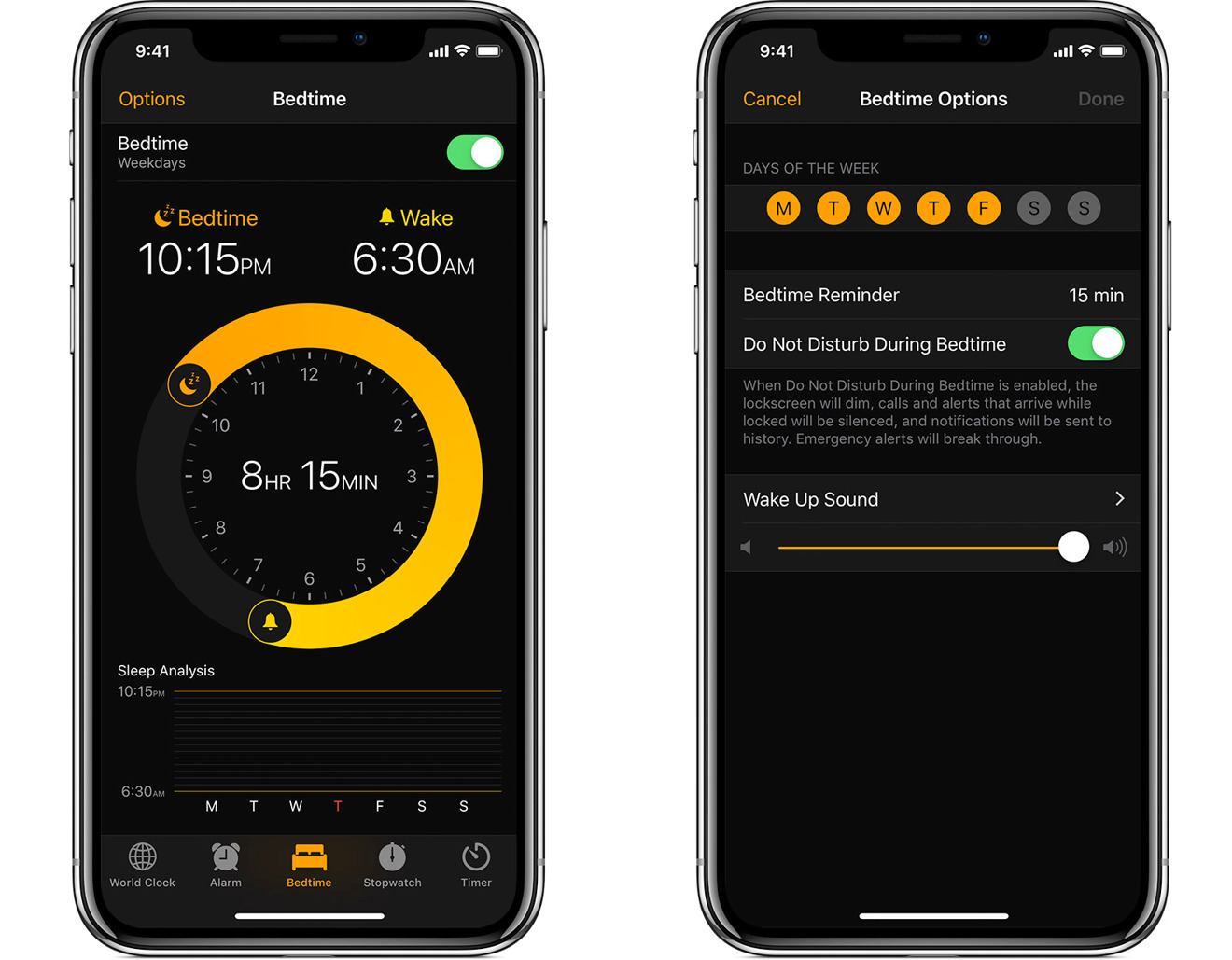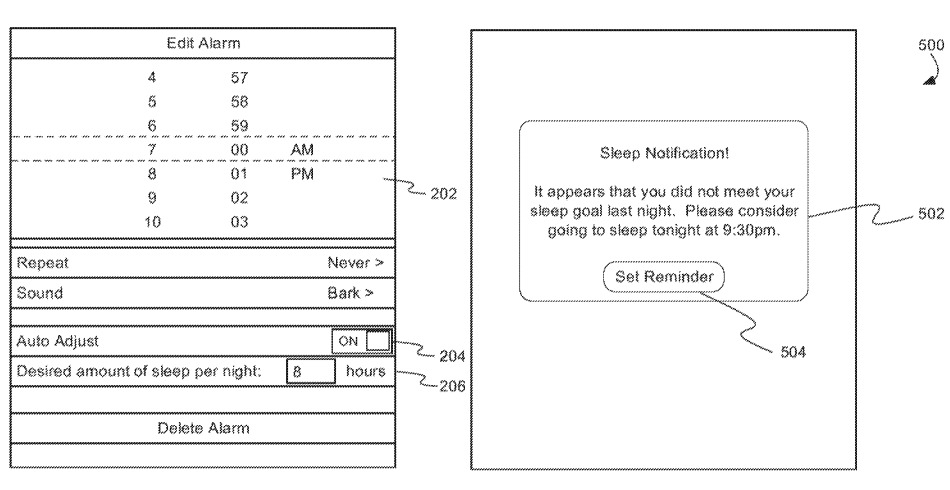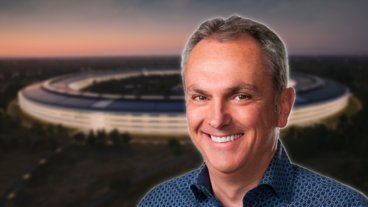Apple has looked into how people can get a full night's sleep, and has come up with a way that allows someone to be woken up after spending a desired amount of time asleep instead of just at a set time, by monitoring when they actually start sleeping.
People typically set an alarm to wake themselves up at a specific time, and try to go to bed at night at a time so that they can spend an amount of time asleep. While users may go to bed at the "correct" time, most don't fall asleep straight away, with the extra awake period eating into their desired sleeping period, so someone wanting eight hours of sleep could end up only sleeping for seven, for example.
A patent application published by the U.S. Patent and Trademark Office on Thursday titled "Adjusting alarms based on sleep onset latency" attempts to solve the issue by changing when the alarm sounds in the morning to wake them up, by determining the exact time the person falls asleep.
The patent suggests the use of a mobile device or a collection of connected hardware, such as an Apple Watch and an iPhone, that can detect a user's sleep rituals before they attempt to sleep, as well as when the user falls asleep. This can include detecting sleep signals from biometric data, sounds, and other elements when the user is trying to rest, as well as activities the user regularly performs before going to sleep, like the combination of checking social media followed by using a meditation app.
The term "sleep onset latency" is referred to by Apple as the "amount of time it takes for the user to fall asleep after the user attempts to go to sleep." By determining when the user sleeps, this can be used to perform a number of functions to make it easier for the user to actually get their full night's sleep.
In one example, Apple suggests a clock with alarms that can be adjusted by the sleep onset latency, with options to change the alarm time to when the user achieves a selected number of hours of sleep. This shift could theoretically change an alarm set to go off at 8am to 8:23am, for example, if the user takes 23 minutes to fall asleep after midnight and wanted a full eight hours of rest.
Knowing the time it takes to sleep could allow the user to be alerted to go to sleep at an earlier time to get their ideal bedrest period and still wake up at the desired time in the morning, with the latency helping inform when this early sleep notification is delivered. The sensing could also detect changes in the latency, as well as the user's sleep patterns, using this data as a prompt to suggest ways they could improve their slumber.
The patent application appears to be a continuation from an already-granted patent of the same name. The latest application was submitted on July 18, 2018, over a year after the earlier patent was granted to the company.
Normally, the existence of a patent or application is not a guarantee of Apple using the described concepts in a future Apple product, but does indicate fields where Apple has spent time and resources researching.
Apple does already offer its iOS users ways to improve their sleeping habits, with Bedtime notifying users of when they should go to bed to achieve a desired period of rest. Though it does not include any system for determining the sleep onset latency or adjusting the alarm in this way, it seems the likely venue for the patent application's features to be introduced in the future via a software update.
Some sleep tracking is being performed by the app, though simply through the iPhone or iPad not being used during Bedtime's sleeping period and not from actively monitoring the user. The Apple Watch does include the necessary hardware to perform monitoring during sleep, but unlike some other fitness trackers on the market, it doesn't have a built-in capability to do so, requiring users to download a tracking app.
Notably, the patent application identifies a prominent sleep researcher as one of its inventors. Formerly employed by Philips Research, sleep expert Dr Roy J.E.M. Raymann was hired by Apple in 2014, with the doctor's previous work involving a variety of sensor technologies that can monitor sleep behaviors that could determine and help treat sleep disorders.
Raymann reportedly departed from Apple in May 2017, at around the same time as the company acquired sleep tracking hardware and software firm Beddit.
 Malcolm Owen
Malcolm Owen








-m.jpg)






 Christine McKee
Christine McKee


 Charles Martin
Charles Martin


 Mike Wuerthele
Mike Wuerthele



-m.jpg)






19 Comments
"Why Are You Late For Work !! "
"Apple's Fault, ….told me I needed more sleep"
"Your Fired"
Class action lawsuit ensues, going after Apples' coffers
Yes, a full night sleep just in time to be late to work.
This is only useful if your unemployed, which means you can't afford the phone... a dilemma...
My employer will be happy to fire me over this if I am late. Well I guess I will use regular clock instead. This is dumbest idea from Apple that I have ever heard. Maybe that works for retired people. I guess other people are getting someting as well. Freeloaders on welfare are getting some solution from Apple. After all they can afford even iPhones.
As an insomniac who has been taking OTC and Melatonin for going on 30 years - this is a HORRIBLE idea.
One of the goals, is to establish a regular sleeping pattern. Sometimes, I lie in bed awake for hours, and only get a few hours sleep. That sucks, and I am miserable that day; but usually after a few days of this, I sleep soundly again. Insomnia is an unpleasant fact that many people learn to live with, but having a phone decide that I will be late for my job, or sleep longer than my allotted time - is not a feature I would ever consider wanting.
Now, when my investments pay off grandly, and I can retire to a lifestyle I desire - I'm all in.